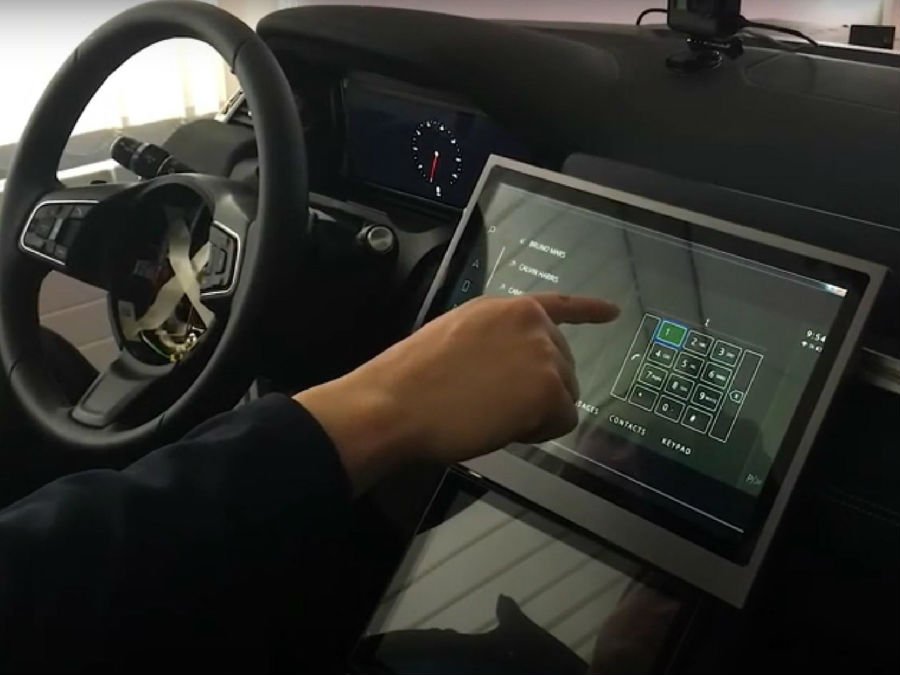(单词翻译:单击)
Cambridge University researchers have developed a "no-touch touchscreen" that uses artificial intelligence to predict a user's intention before their hand reaches the display.
英国剑桥大学的研究人员研发了一种“非接触式触摸屏”。这种触摸屏利用人工智能技术,在使用者用手触碰屏幕前,预测其意图。
The screen was originally designed for use in cars, but the engineers who built it claim it could also have widespread applications during a pandemic.
这种屏幕最初是为汽车设计的,但研发屏幕的工程师称,它也可在疫情期间被广泛应用。
The "predictive touch" technology can be retrofitted to existing displays and could be used to prevent the spread of pathogens on touchscreens at supermarket check-outs, ATMs and ticket terminals at railway stations.
这种“预测性触摸”技术可以加装在现有屏幕上,可以用来防止病原体在超市收银台、自动取款机和火车站售票终端机的触摸屏上传播。
Studies have shown that coronavirus can remain on plastic and glass for anywhere between two hours and a week, meaning touchscreens in public places need to be constantly disinfected to prevent transmission.
研究表明,新冠病毒可以在塑料和玻璃上停留两小时至一周时间,这意味着公共场所的触摸屏需要不断消毒以防病毒传播。

"Touchscreens and other interactive displays are something most people use multiple times per day, but they can be difficult to use while in motion, whether that's driving a car or hanging the music on your phone while you're running," said Simon Godsill from the university's department of engineering.
英国剑桥大学工程系的西蒙·戈德西尔说:“触摸屏和其他交互式显示屏是大多数人每天频繁使用的物品,但人们可能很难在运动状态中使用,无论是驾驶汽车还是在跑步时用手机播放音乐。”
"We also know that certain pathogens can be transmitted via surfaces, so this technology could help reduce the risk for that type of transmission."
“我们还知道,某些病原体可以通过物品的表面传播,因此这项技术可以帮助降低这种传播风险。”
The technology works by predicting where a user intends to touch the screen as they begin the hand movement towards the screen. A combination of AI and sensors determine the user's intent in real time by also tracking contextual information like the user's profile, environmental conditions and an eye-gaze tracker.
这项技术的工作原理是,在用户开始用手触摸屏幕前,预测他们想要触摸屏幕的哪一区域。人工智能和传感器通过追踪情景信息(比如用户的个人资料、环境状况和眼动跟踪)实时判断用户的意图。
Other touch-free technologies include gesture control, which can be found on the latest generation of Google and Samsung smartphones, as well as some smart TVs.
其他非接触式技术还包括手势控制,最新一代谷歌和三星智能手机以及一些智能电视都已使用手势控制。
Haptic feedback technology also offers a way to interact with digital devices and environments, though it still needs developing and is yet to see broad commercial use.
触觉反馈技术还提供了一种与数字设备和环境进行交互的方式,但它仍在研发之中,而且尚未展现出广泛的商业用途。
"Our technology has numerous advantages over more basic mid-air interaction techniques or conventional gesture recognition, because it supports intuitive interactions with legacy interface designs and doesn't require any learning on the part of the user," said Dr Bashar Ahmad, who led the development of the touchless screen
“非接触式触摸屏”研发项目负责人巴沙尔·艾哈迈德说:“相较于较为基础的空中互动技术或常规手势识别技术,我们的技术有很多优势,因为它支持与传统界面设计的直觉互动,不需要用户进行任何学习。”
"It fundamentally relies on the system to predict what the user intends and can be incorporated into both new and existing touchscreens and other interactive display technologies."
“它完全依靠系统来预测用户意图,并可以与新旧触摸屏以及其他交互显示技术融为一体。”


